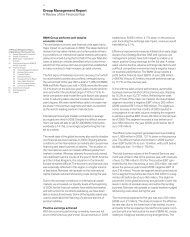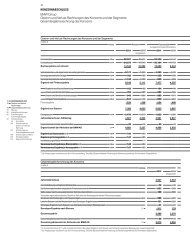Sustainable Value Report 2001/2002 - BMW Group
Sustainable Value Report 2001/2002 - BMW Group
Sustainable Value Report 2001/2002 - BMW Group
You also want an ePaper? Increase the reach of your titles
YUMPU automatically turns print PDFs into web optimized ePapers that Google loves.
sibility for integrating people with disabilities<br />
into the work process.The company also<br />
outsources work to government-approved<br />
employers of disabled citizens.<br />
<strong>BMW</strong> AG employs over 2,000 handicapped<br />
persons who represent 3.4 percent of the<br />
company’s workforce. Work orders to handicapped<br />
suppliers reached a total volume of<br />
nearly c21 million in 2000. In this way, <strong>BMW</strong> AG<br />
makes a significant contribution to helping the<br />
handicapped secure meaningful employment.<br />
Further improvement to health and work<br />
safety<br />
Today’s jobs in industrial enterprises must be<br />
secured both economically and in terms of<br />
employee health. Over the past 10 years, <strong>BMW</strong><br />
has consistently reduced the frequency of<br />
industrial accidents.The number of reported<br />
job-related accidents involving hourly workers<br />
at <strong>BMW</strong> AG totaled 396 in 1999.This figure<br />
decreased by 18 percent in 2000 to 326.The<br />
primary focus of <strong>BMW</strong> <strong>Group</strong> health protection<br />
is on prevention. Along with a comprehensive<br />
sports and recreation program, the <strong>BMW</strong><br />
plant in Munich provides a fitness center for<br />
Proportion of foreign nationals at <strong>BMW</strong> AG*<br />
* Includes all non-German citizens<br />
employees. In 1999 this was supplemented by<br />
the “MOVE” center offering physical therapy for<br />
employees suffering from muscular or skeletal<br />
ailments. Medical facilities available at various<br />
<strong>BMW</strong> sites include health centers with doctor’s<br />
offices, mental health services, and substance<br />
abuse programs.This targeted approach to<br />
employee health at <strong>BMW</strong> AG contributed to a<br />
decrease in the hours lost due to sickness<br />
from 5.1 percent in 1995 to 4.4 percent in 2000.<br />
Campaign for tolerance<br />
<strong>BMW</strong> employees come from over 100 different<br />
nations. Around 12.4 percent of <strong>BMW</strong> AG<br />
workers are from countries outside of Germany.<br />
Consequently, the guidelines of the long-term<br />
<strong>BMW</strong> <strong>Group</strong> personnel policy focus on transcending<br />
national and cultural borders. For<br />
over 30 years, this principle has been a mainstay<br />
of <strong>BMW</strong> campaigns to prevent discrimination<br />
both inside and outside of the company.<br />
The main emphasis of this work is on crosscultural<br />
learning designed to bring different<br />
nationalities and ethnic groups together.<br />
“If we, as a company, are made to ‘feel at home’ everywhere in the world,<br />
then it must be important for us to ensure that everyone who comes to<br />
work for <strong>BMW</strong> is treated equally and respected as an individual.”<br />
Professor Joachim Milberg, <strong>BMW</strong> <strong>Group</strong> Chairman of the Board<br />
70,000<br />
60,000<br />
50,000<br />
40,000<br />
30,000<br />
20,000<br />
10,000<br />
0<br />
’96 ’97 ’98 ’99 ’00<br />
8,185 8,130 8,409 8,229 8,205<br />
<strong>BMW</strong> workers at the Kaliningrad plant<br />
Foreign nationals<br />
(13.8%) (13.4%) (13.1%) (12.9%) (12.4%) Percentage<br />
51,235 52,463 55,651 55,556 58,057 German nationals<br />
71



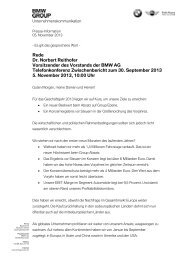
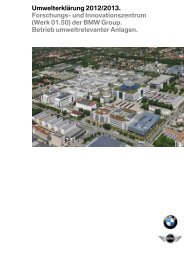

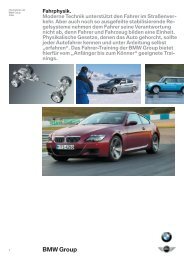
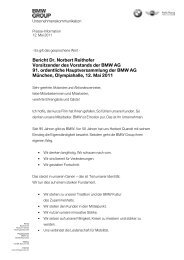
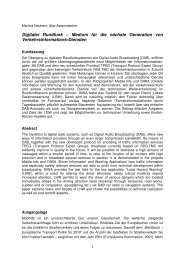
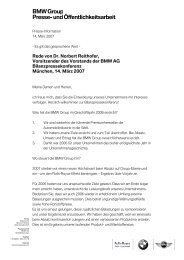
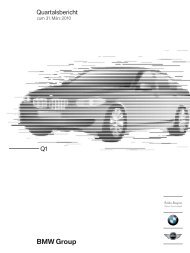
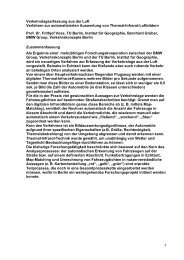
![Vollständiger Bericht [PDF] - BMW Group](https://img.yumpu.com/20706531/1/190x238/vollstandiger-bericht-pdf-bmw-group.jpg?quality=85)



